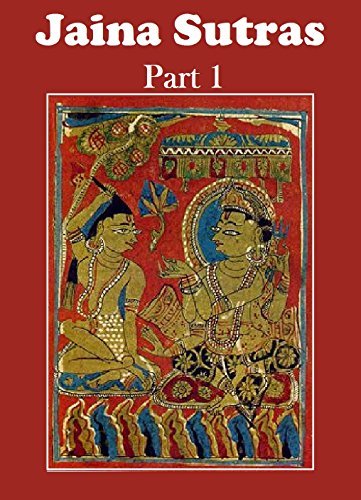Acaranga-sutra
by Hermann Jacobi | 1884 | 71,211 words | ISBN-10: 8120801237 | ISBN-13: 9788120801233
The English translation of the Acaranga Sutra, which represents the first the 12 Angas in Shevatambara Jainism. It is traditionally dated to the 5th-century BCE and consists of two parts containing lectures based on the teachings of Mahavira. Topics include: lifestyle of an ascetic: conduct, behavior, collecting alms, clothes, mode of walking and ...
Lecture 1, Lesson 8
A monk or a nun on a begging-tour should not accept juice of mangos, inspissated juice of mangos, juice of wood-apples, citrons, grapes, wild dates, pomegranates, cocoa-nuts, bamboos, jujubes, myrobalans, tamarinds, or any such-like liquor containing particles of the shell or skin or seeds, which liquor the layman, for the sake of the mendicant, pressed, strained, or filtered through a basket[1], cloth, or a cow’s tail; for such liquor is impure and unacceptable. (1)
When a monk or a nun on a begging-tour smells, in travellers‘ houses or garden houses or householders’ houses or maṭhs, the scent of food or drink or sweet scents, they should not smell them, being indifferent against smell, and not eager or desirous or greedy or covetous of the pleasant smell. (2) A monk or a nun on a begging-tour should not accept raw things which are not yet modified by instruments[2], as bulbous roots, growing in water or dry ground, mustard stalks; for they are impure and unacceptable. The same holds good with regard to long pepper, ground long pepper, common pepper, ground common pepper, ginger or ground ginger. (3)
A monk or a nun on a begging-tour should not accept such raw fruits which are not yet modified by instruments, as those of Mango, Amrāṭaka, Jhijjhīrā[3], Surabhi[4], Sallakī[5]; for they, &c. (4)
The same holds good with regard to raw shoots which, &c., as those of Aśvattha, Nyagrodha, Pilaṃkhu[6], Nīyūra[7], Sallakī. (5)
The same holds good with regard to raw berries which, &c., as those of Kapittha[8], pomegranate, or Pippala. (6)
A monk or a nun on a begging-tour should not accept raw, powdered fruits which are not well ground and still contain small seeds, as those of Umbara, Pilaṃkhu, Nyagrodha, and Aśvattha; for &c. (7)
A monk or a nun on a begging-tour should not accept unripe wild rice[9], dregs, honey, liquor, ghee, or sediments of liquor, if these things be old or if living beings are engendered or grow or thrive in them, or are not taken out, or killed or destroyed in them. (8)
A monk or a nun on a begging-tour should not accept any such-like raw plants[10] as Ikṣumeru, Aṅkakarelu, Kaśeru, Saṃghāṭika, Pūtiālu. (9)
A monk or a nun on a begging-tour should not accept any such-like (vegetables) as Nymphaea or stalk of Nymphaea or the bulb of Nelumbium or the upper part or the filament of Lotus or any part of the plant. (10)
A monk or a nun on a begging-tour should not accept such-like raw substances as seeds or sprouts, growing on the top or the root or the stem or the knots (of a plant), likewise the pulp or blossoms of the plantain, cocoa-nut, wild date, and palmyra trees. (11)
A monk or a nun on a begging-tour should not accept any such-like raw unmodified substances as sugar-cane, which is full of holes, or withering or peeling off or corroded by wolves; or the points of reeds or the pulp of plantains. (12)
The same holds good with regard to garlic or its leaves or stalk or bulb or integument. (13) Likewise with regard to cooked fruits of Atthiya[11], Tinduka[12], Vilva[13], Śrīparṇī[14]. (14)
A monk or a nun on a begging-tour should not accept such raw, unmodified substances as corn, clumps of corn, cakes of corn, sesamum, ground sesamum, or cakes of sesamum.
This is the whole duty, &c.
Thus I say. (15)
Footnotes and references:
[2]:
I.e. when they have undergone no operation which takes the life out of them.
[3]:
Name of a shrub.
[4]:
Explained by śatagru.
[5]:
Boswellia Thurifera.
[6]:
Explained by pipparī.
[7]:
Cedrela Toona.
[8]:
The wood-apple tree, Feronia Elephantum.
[9]:
.Āmaḍāga, explained in the commentary āmapaṇṇam, unripe or half ripe, araṇikatandulīyakādi.
[10]:
Of these plants only Kaśeru, a kind of grass, and Saṃghāṭika Trapa Bispinosa are specialised in our dictionaries.
[11]:
A certain tree.
[12]:
Diospyros Glutinosa.
[13]:
Aegle Marmelos.
[14]:
Pistia Stratiotes.
